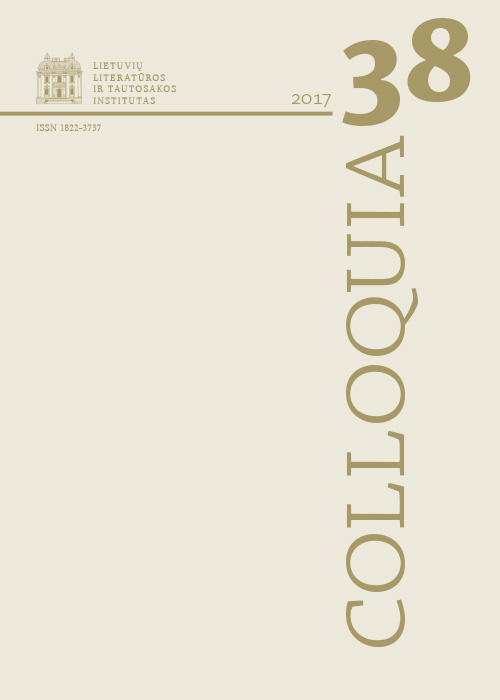Feminist Phenomenology in the Criticism of Birutė Ciplijauskaitė
Abstract
This article presents feminist phenomenology, a paradigm within critical philosophy and literary studies that been evolved over the last several decades; the article explores the main circumstances of its development, including the historical contexts and texts that led to its emergence and conceptualisation. The origins of this syncretic approach are associated with the works of Edith Stein, Simone de Beauvoir, Maurice Merleau-Ponty, and Hannah Arendt. The article discusses feminist phenomenology’s broad, interdisciplinary streams – feminist musicology, theology, philosophy of science, and ethics – and how they use research tools offered by phenomenology.
Feminist phenomenology is seen as an approach that challenges disciplinary hermeticism, which holds human experience as the most important object of any analysis.
The article surveys the works of the main authors who were actively involved in the process of introducing feminist phenomenology: Sara Heinämaa, Lanei Rodemeyer, Mikko Keskinen, Linda Fisher, María C. López Sáenz, Eva-Maria Simms, Beata Stawarska, Lester Embree, Christina Schües, Dorothea E. Olkowski, Helen A. Fielding, and Anne van Leeuwen.
The article presents general research strategies and classifications at the intersection of feminism and phenomenology, most importantly: embodied experience, a critical view of patriarchal structures of power and knowledge, qualitatively new experience, a focus on synaesthesia and a particular emphasis on different types of women’s/female experience. The second half of the article presents the work (in particular several late texts) of the Lithuanian émigré critic Birutė Ciplijauskaitė as an example of feminist phenomenology.
Downloads
Most read articles in this journal
- Dalia Jakaitė, Imprints of Prayer in Memory: Lyrical Subject’s Experience in the Poetry of Alfonsas Nyka-Niliūnas and Czesław Miłosz , Colloquia: Vol. 50 (2022): Colloquia
- Jūratė Sprindytė, The Intelligentsia in a Political Epoch , Colloquia: Vol. 49 (2022)
- Gintarė Bernotienė, Renaldas Gudauskas, Vytautas Landsbergis, Rasa Juknevičienė, Andrius Kubilius, Emanuelis Zingeris, Donata Mitaitė, Vytautas Ališauskas, Laurynas Peluritis, “Can I Still Accomplish Anything?” Vytautas Kubilius and the Role of Intellectual and Critical Thinking in Nation-Building , Colloquia: Vol. 52 (2023): Colloquia
- Gitana Vanagaitė, Romantic Idealism and Nationalism—Two Important Components of Juozas Tumas-Vaižgantas’s Worldview , Colloquia: Vol. 44 (2020)
- Birutė Avižinienė, Literature and Its Authors in the Interwar Lithuanian Radio Programs , Colloquia: Vol. 46 (2021)
- Rita Tūtlytė, An Attempt to Reconstruct the Generation of Žemininkai: Benediktas Labėnas , Colloquia: Vol. 49 (2022)
- Dalia Jakaitė, Openness of Existential Temporal Experiences to (Non)Being: The Poetry of Vaidotas Daunys and Valdas Gedgaudas , Colloquia: Vol. 36 (2016)
- Mindaugas Kvietkauskas, From Shulhoyf to Montparnasse: Cultural Collage in Moshé Vorobeichic's Photography Book The Ghetto Lane in Wilna (1931) , Colloquia: Vol. 48 (2021)
- Petras Bražėnas, A Monument to a Great Personality , Colloquia: Vol. 49 (2022)
- Dalia Satkauskytė, The Biography of a Writer as an Argument in (De)Canonisation , Colloquia: Vol. 53 (2024): Colloquia




